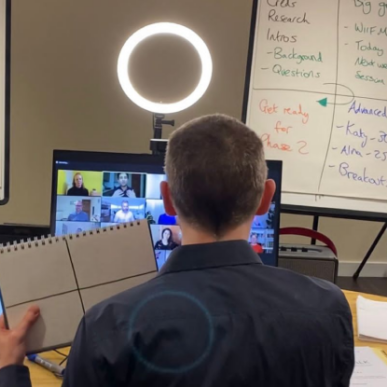“Trust is perhaps the most important factor of any business relationship, and it needs to be built from the first moment you meet someone.“
Business Communication For Networking: Why Is It Important?
You know the importance of networking. It’s a great way to build relationships, gain new clients, and grow your business. But did you know HOW you communicate with other professionals can make or break your networking efforts? That’s right – how you communicate is just as important as who you communicate with when it comes to networking.
Business Communication Explained
When you’re networking, you’re trying to build relationships with other professionals. And one of the most important aspects of any relationship is communication. If you want to build strong, lasting relationships with other professionals, you need to communicate effectively. This means more than just exchanging business cards or small talk. It means getting to know the other person and understanding their needs.
Unfortunately, many people don’t realise the importance of communication. They see networking as a way to get new clients or leads and focus solely on that goal. But if you want to build strong relationships, taking the time to communicate well and connect with the person you’re speaking with is essential.
Here are four tips to help you communicate effectively when networking:
Build Trust
Trust is perhaps the most important factor of any business relationship, and it needs to be built from the first moment you meet someone. You may have heard of something called the Trust Equation. It’s a simple formula that shows how trust is built:
Credibility + Reliability + Intimacy / Self-Orientation = Trust
In other words, if you want to be trusted by someone, you need to be credible, reliable, and intimate with them. And you need to make sure your own self-orientation – that is, your focus on yourself – is low.
Let’s break down each part of the equation a little further:
Credibility refers to your knowledge and expertise. Do you know what you’re talking about? Can you provide value to the other person?
Reliability means being consistent and dependable. Can the other person count on you? Will you follow through on your promises?
Intimacy is about connection and rapport. Do they feel comfortable talking to you? What do you both have in common? Do you understand their needs and concerns?
Self-orientation is all about you. Are you more focused on what you want or what the other person wants? The lower your self-orientation, the more trust you’ll build.
If you want to build trust with someone, focus on being credible, reliable, and intimate with them. And make sure your own self-orientation is low.
Listen More Than You Talk
Many business professionals make the mistake of doing most of the talking when they’re networking. They see it as a chance to pitch their business and try to sell the other person what they have to offer.
But if you want to build strong relationships, you must focus on the other person more than yourself. You need to listen to what they’re saying and get to know them as a person. Only then will you be able to understand their needs and how you can help them. Also, listen with the intent to understand rather than listen with the intent to reply. Too many conversations fall flat because people jump in with what they want to say rather than responding to what the other person has said. It’s the quickest way to lose trust because people will feel you only care about yourself. As with the trust equation above, it’s high self-orientation with low intimacy. So, make sure you’re truly listening to what the other person is saying – not just waiting for your turn to talk!
Ask Questions
Listening well leads directly to asking good questions, and the combination is a great way to show you’re interested in the other person. Asking questions also allows you to learn more about them and their needs.
However, not all questions are created equal. Avoid closed questions that can be answered with a simple ‘yes’ or ‘no’; otherwise, a conversation quickly feels like an interrogation. Instead, focus on open-ended questions encouraging the other person to share more information. For example:
How did you get interested in this industry?
What challenges are you facing in your business right now?
What has been your most successful networking experience?
These sorts of questions will help you get to know the other person better, understand their challenges and discover how you can help them. They’ll appreciate that you’re interested in them as a person, not just a potential client or lead.
Mind Your Body Language
Your body language communicates a lot about how you’re feeling, which can significantly affect how the other person perceives you. One of the key things with body language is to make sure you’re being congruent, which means your words, tone of voice and body language all match up.
For example, if you say you’re interested in what the other person is saying, but your body language says otherwise (e.g., looking at your phone or glancing at someone else you want to speak to), they won’t believe you. On the other hand, if your body language is open and inviting (e.g. making eye contact, leaning forward), it will help build rapport and trust.
Examples Of Business Networking
Business Networking can take many forms. It can be as simple as conversing with someone at a networking event or going for coffee with a potential client. It can also be more formal, such as presenting at a conference or attending a business mixer. The global pandemic greatly impacted how we network: and, for a time, it didn’t happen. Platforms like Zoom and Microsoft Teams soon became the gateway to keep the networking going, and virtual catch-ups remain part of the networking strategy, although many are probably relieved to escape from the kitchen table for a face-to-face coffee.
Here are some examples of Business Networking:
- Attending industry events and trade shows
- Hosting or attending webinars
- Giving presentations or workshops
- Networking at business mixers and social gatherings
- Building relationships on social media sites like LinkedIn, Twitter and Instagram
- Asking someone to be a guest on your podcast
- Becoming a guest blogger
No matter what form it takes, the goal of Business Networking is always the same: to build relationships and create opportunities.
The Benefits of Networking In Business
Business Networking can be beneficial for both individuals and organizations. For individuals, it’s a great way to build your professional network and meet new people. It can also help you develop new skills and knowledge and expand your career opportunities.
Business Networking can help organisations build relationships with potential customers, partners, and suppliers. It can also generate new leads and business opportunities, find new employees and build brand awareness and loyalty.
In short, Business Networking is a powerful tool that can benefit individuals and organisations.
Types of Business Networking Strategies
Business Networking can take many forms, and there’s no one-size-fits-all approach. The best way to network depends on your goals, the industry you’re in, and your personal style.
That said, there are some common types of Business Networking strategies:
- One-on-one meeting: This is the most common type of networking and could be a catch-up over coffee, lunch, or a drink after work.
- Attending events: Networking events are a great way to meet new people in your industry. They can be large conferences or small local meetups.
- Joining groups: There are many professional groups and organisations you can join. This could be an industry association, trade group, or LinkedIn group. Your local Chamber of Commerce is often a good starting point.
- Presenting at events or conferences is a great way to build your reputation and meet new people.
- Media: Getting involved with the media is a great way to build your brand and reach a wider audience. This can include things like writing articles or blog posts, being interviewed on podcasts or webinars, or offering insight into a story on your local TV or radio station.
Who Benefits From Networking Communication Skills?
Networking is a great way to build your professional network and meet new people, and the ability to do so effectively is a valuable skill for anyone in business. Whether you’re a salesperson, entrepreneur, or team player, networking can help you meet new people, build relationships, and create opportunities.
That said, networking is not just for people in business. Networking skills can be beneficial when meeting new people or building relationships. This could be for personal reasons, such as meeting new friends or dating, or for professional reasons, such as finding a job or building your career.
Tips For Great Business Networking
If you want to be successful at Business Networking, you should keep a few things in mind. As mentioned at the beginning, focus on building relationships and not try to sell anything. Second, be genuine and authentic. People can tell when you’re not being sincere, which will turn them off. Third, be patient. It takes time to build relationships, so don’t expect instant results. Fourth, follow up after meeting someone. Send them an email or LinkedIn message and stay in touch. Finally, don’t forget to have fun! It will show if you’re not enjoying yourself and people will be less likely to want to talk to you.
Can We Help You With Your Business Networking Skills?
We can offer guidance and support if you want help with your Business Networking by developing your networking skills, increasing your confidence and making the most of your interactions. From questioning and listening skills to business storytelling, we’ll have a course which is just right for you. Contact us today to learn more.
You can also watch or listen to your podcast below, where Emily Fairman and Richard Newman talk about how to build trust in your business relationships.
The Body Talk Podcast – How To Create Trust from Body Talk on Vimeo.





















